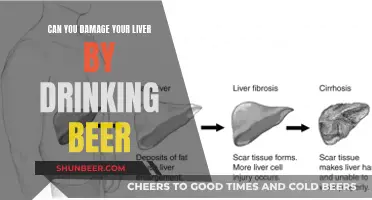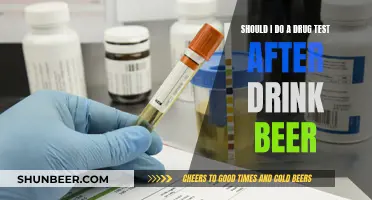
Alcohol does not directly cause acne, but it can trigger breakouts and aggravate existing acne by affecting the body in ways that may indirectly cause or worsen the skin issue. Alcohol is a diuretic, which means it increases urine production, flushing out water and salt and leaving the skin dehydrated. Dehydration can cause the skin to produce excess oil, which may lead to acne breakouts. Alcohol can also affect the immune system, making the body more susceptible to infections such as Propionibacterium acnes (P. acnes) bacteria, which are known to cause acne. In addition, alcohol can cause changes in hormone levels, such as testosterone and estrogen, which can stimulate oil glands and lead to increased oil production, clogged pores, and acne breakouts. Alcohol's high sugar content can also cause inflammation and raise blood sugar levels, contributing to acne. Finally, excessive alcohol consumption can damage the liver, impairing its ability to remove toxins, which may then be expelled through the skin, potentially leading to acne. While alcohol does not directly cause acne, its various effects on the body can create the conditions for acne to develop or worsen.
| Characteristics | Values |
|---|---|
| Direct Link | There is no direct link between alcohol consumption and acne. |
| Indirect Link | Alcohol affects the body in ways that may indirectly cause or worsen acne. |
| Dehydration | Alcohol is a diuretic, which causes dehydration, leading to acne breakouts. |
| Immune System | Alcohol reduces immune system functionality, making the body more prone to infections and acne breakouts. |
| Inflammation | Alcohol increases insulin levels, leading to increased oil production and acne breakouts. |
| Liver Function | Excessive alcohol consumption can damage the liver, impairing its ability to remove toxins, which can then be expelled through the skin, causing acne. |
| Hormones | Alcohol affects testosterone and estrogen levels, leading to hormonal imbalances that can trigger acne breakouts. |
What You'll Learn
- Alcohol is a diuretic, which causes dehydration and can lead to acne
- Alcohol can weaken the immune system, making it easier for acne-causing bacteria to infect the skin
- Alcohol can cause hormonal imbalances, which can trigger acne breakouts
- Alcohol is high in sugar, which can cause inflammation and increase the risk of acne
- Alcohol can affect the liver's ability to remove toxins, which can result in acne

Alcohol is a diuretic, which causes dehydration and can lead to acne
Alcohol is a diuretic, meaning it increases urine production and flushes out excess water and salt from the body. This can lead to dehydration, which may, in turn, cause acne.
When dehydrated, the skin can become dry and tight, and the body's oil glands may produce more oil to compensate for the loss of water. This excess oil can then clog pores and lead to acne breakouts.
In addition to dehydration, alcohol can also affect the immune system, liver function, inflammation, and hormones, all of which can contribute to acne development. Therefore, while alcohol does not directly cause acne, its impact on the body can create the perfect conditions for acne to form.
To minimize the risk of acne caused by alcohol consumption, it is recommended to drink in moderation and to alternate alcoholic drinks with water to stay hydrated.
Beer and Potassium: Is There a Link?
You may want to see also

Alcohol can weaken the immune system, making it easier for acne-causing bacteria to infect the skin
Alcohol can have a detrimental impact on the immune system, which in turn can make the skin more susceptible to acne-causing bacteria.
The immune system is made up of cytokines and other protective cells that work to keep harmful bacteria and viruses at bay. Alcohol can decrease the number of these protective cells in the body and even destroy them, making the body more susceptible to infections.
Take Propionibacterium acnes (P. acnes) bacteria as an example. These bacteria are known to cause cysts and pustules. While P. acnes can infect your skin at any time, a person may be more susceptible when their immune system is suppressed.
Although researchers have not established a direct link between alcohol and P. acnes, the relationship between the immune system, bacteria, and alcohol is significant. Alcohol can weaken the immune system, making it easier for acne-causing bacteria to infect the skin and trigger breakouts.
In addition to its effects on the immune system, alcohol can also contribute to acne by affecting hormone levels, causing dehydration, and impacting liver function. Alcohol is processed by the liver as a toxin, and excessive consumption can impair its ability to remove toxins from the body. If the liver is overwhelmed, toxins may be expelled through the skin, potentially leading to acne breakouts.
Alcohol can also cause dehydration, as it has a diuretic effect, increasing urine production and flushing out water and salt from the body. This can lead to dry skin, and the resulting oil gland overproduction of oil can increase the risk of breakouts.
While alcohol does not directly cause acne, its impact on the immune system and other bodily functions can create an environment that makes the skin more prone to acne-causing bacteria and subsequent breakouts.
Priming Your Beer: The Science Behind Carbonation
You may want to see also

Alcohol can cause hormonal imbalances, which can trigger acne breakouts
Alcohol can have a detrimental impact on the skin due to a variety of factors. One of the main factors is its diuretic effect, which increases urine production and flushes out water and salt from the body, leading to dehydration. This, in turn, can cause the skin to become dry, and as a result, the oil glands in the body may trigger the overproduction of oil to compensate for water loss, making the skin more prone to acne breakouts.
Another way alcohol can contribute to acne is by causing hormonal imbalances. Alcohol affects testosterone levels in both men and women. While it lowers testosterone levels in men, a small study found that it can increase testosterone levels in women. Furthermore, alcohol can increase estradiol levels in women, a form of estrogen. Increased hormone levels can stimulate oil glands, leading to increased oil production, which can clog pores and result in acne breakouts.
In addition to dehydration and hormonal imbalances, alcohol can also reduce immune system functionality, making the body more susceptible to infections. This includes Propionibacterium acnes (P. acnes) bacteria, which are known to cause cysts and pustules associated with acne. While there is no direct link established between alcohol and P. acnes, the relationship between alcohol, the immune system, and bacteria is worth considering when examining the potential causes of acne.
While alcohol does not directly cause acne, its indirect effects on the body, such as dehydration, hormonal imbalances, and immune system dysfunction, can create the perfect environment for acne to develop. Therefore, if you suffer from acne, it is advisable to limit or avoid alcohol consumption altogether.
Enjoying Beer While Watching Champions League Games
You may want to see also

Alcohol is high in sugar, which can cause inflammation and increase the risk of acne
Alcohol is a diuretic, which means it increases urine production, causing the body to lose water and salt. This can lead to dehydration, which can cause or worsen acne. Dehydration can also make the skin look sunken or saggy.
When the skin is dehydrated, the body's oil glands produce more oil to compensate for the loss of water. This excess oil can clog pores and lead to acne breakouts. Alcohol also contains high levels of sugar, which can cause inflammation and increase the risk of acne.
Sugar can trigger inflammation by increasing insulin levels, which leads to increased oil production. Inflammation is one of the primary causes of acne. It occurs when sebum and dead skin cells clog follicles, leading to redness and swelling. In addition to sugar, other factors that can contribute to inflammation include hormonal imbalances and autoimmune diseases.
Drinking alcohol in excessive amounts can also weaken the immune system, making it easier for bacteria such as Propionibacterium acnes (P. acnes) to infect the skin and cause acne breakouts. While there is no direct link between alcohol consumption and acne, the negative effects of alcohol on the body can indirectly lead to skin issues, including acne breakouts.
Plant-Based Diet: Beer and Wine - Friend or Foe?
You may want to see also

Alcohol can affect the liver's ability to remove toxins, which can result in acne
Alcohol can have a detrimental impact on the skin due to a variety of factors. One of the main factors is its diuretic effect, which increases urine production and flushes out water and salt from the body, leading to dehydration. This can cause the skin to become dry and trigger the oil glands to produce more oil to compensate for the loss of water, making the skin more prone to acne breakouts.
Another way alcohol can affect the skin is by reducing immune system functionality. Alcohol can lessen the function of the immune system, making the body more susceptible to infections and attacks by foreign bodies, which can lead to skin breakouts.
Additionally, alcohol can cause an imbalance in hormone levels, particularly testosterone and estrogen. This can stimulate the oil glands, leading to increased oil production and potentially resulting in clogged pores and acne breakouts.
Furthermore, alcohol can negatively impact liver function. The liver is responsible for removing harmful toxins from the body, but excessive alcohol consumption can overwhelm the liver and reduce its ability to effectively remove toxins. If the liver is unable to remove toxins, they may be stored within the body or expelled through other channels, such as the skin, which can result in a breakout.
While alcohol does not directly cause acne, its indirect effects on the body, including dehydration, immune system suppression, hormone imbalances, and liver dysfunction, can contribute to skin issues and increase the likelihood of acne breakouts.
Beer on 'Gunsmoke': Real Deal or Prop?
You may want to see also
Frequently asked questions
Drinking too much beer can lead to acne, but not directly. Beer and other alcoholic drinks can cause dehydration, which can lead to acne breakouts. They can also affect your hormones, liver function, and immune system, which can all contribute to acne.
Alcoholic drinks like beer are diuretics, which means they make you produce more urine. This can lead to dehydration, making your skin dry and prone to acne.
Alcohol can affect your hormones, including testosterone and estrogen, which can stimulate oil glands and lead to clogged pores and acne. It can also impact your liver function and immune system, making it harder for your body to fight off bacteria and remove toxins, both of which can contribute to acne.
To prevent acne breakouts, it's recommended to drink in moderation, avoid sugary drinks, and stay hydrated by drinking water before, during, and after consuming alcohol.







